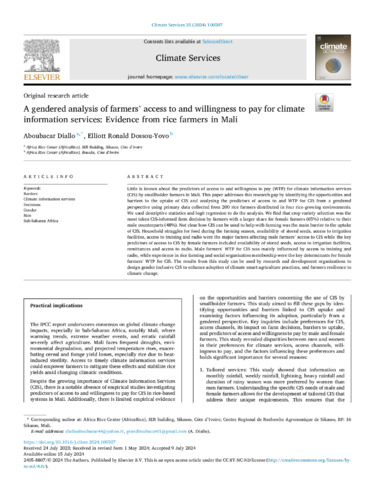A gendered analysis of farmers’ access to and willingness to pay for climate information services: Evidence from rice farmers in Mali
Abstract
Little is known about the predictors of access to and willingness to pay (WTP) for climate information services (CIS) by smallholder farmers in Mali. This paper addresses this research gap by identifying the opportunities and barriers to the uptake of CIS and analysing the predictors of access to and WTP for CIS from a gendered perspective using primary data collected from 200 rice farmers distributed in four rice-growing environments. We used descriptive statistics and logit regression to do the analysis. We find that crop variety selection was the most taken CIS-informed farm decision by farmers with a larger share for female farmers (65%) relative to their male counterparts (48%). Not clear how CIS can be used to help with farming was the main barrier to the uptake of CIS. Household struggles for food during the farming season, availability of stored seeds, access to irrigation facilities, access to training and radio were the major factors affecting male farmers’ access to CIS while the key predictors of access to CIS by female farmers included availability of stored seeds, access to irrigation facilities, remittances and access to radio. Male farmers’ WTP for CIS was mainly influenced by access to training and radio, while experience in rice farming and social organisation membership were the key determinants for female farmers’ WTP for CIS. The results from this study can be used by research and development organizations to design gender inclusive CIS to enhance adoption of climate smart agriculture practices, and farmers resilience to climate change.

